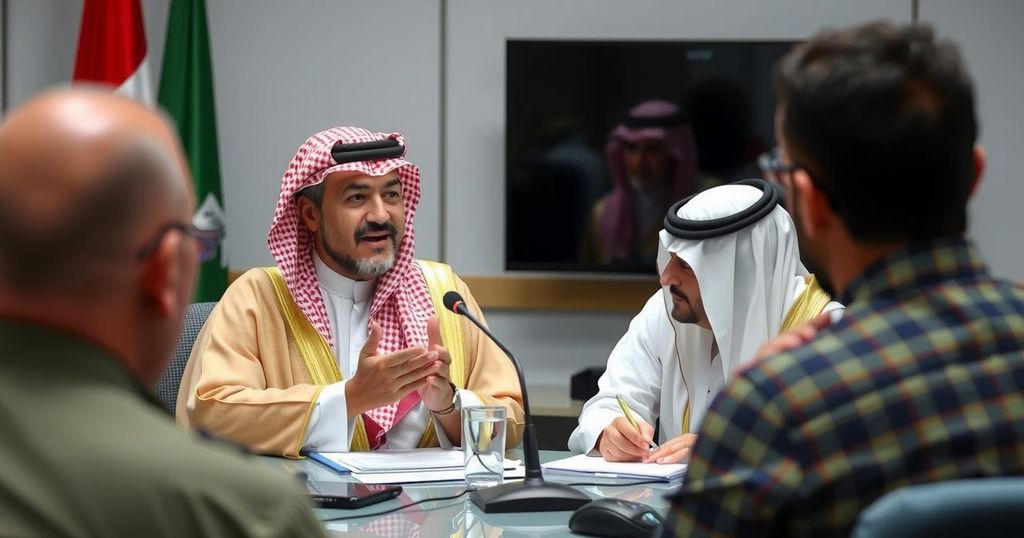In a pivotal meeting, Syria’s new leader Ahmed Al-Sharaa pledged to avoid negative interference in Lebanon, signaling a potential shift in relations. Welcoming a delegation led by Walid Jumblatt, he emphasized the need for economic and political stability, acknowledging past grievances. Concurrently, discussions regarding accountability for war crimes and recent security incidents have arisen, highlighting the complexities of rebuilding ties between the two nations.
In a historic meeting in Damascus, Syria’s newly appointed leader, Ahmed Al-Sharaa, expressed a commitment to avoid past negative interference in Lebanon. Welcoming a prominent Lebanese delegation led by Druze leader Walid Jumblatt, Al-Sharaa articulated a desire to foster a new relationship characterized by mutual respect and support. The delegation’s visit marked the first of its kind since the downfall of Bashar Assad’s regime, stirring both hope and apprehension regarding future Lebanese-Syrian ties.
Al-Sharaa candidly addressed historical grievances, acknowledging Syria’s detrimental past involvement in Lebanese affairs—including the assassinations of key political figures. He stated, “Syria was a source of concern and disturbance for Lebanon, and its interference in Lebanese affairs was negative,” emphasizing the need for a fresh start devoid of the previous regime’s legacy. He called on the Lebanese to move beyond the past and work towards economic and political stability, which he noted Syria would support.
During the meeting, Jumblatt lauded the Syrian people’s resilience in overcoming oppression and tyranny, while advocating for enhanced Lebanese-Syrian relations through formal diplomatic channels. He underscored the necessity for justice regarding crimes committed during the Assad regime, expressing hope for accountability in both nations. On a related note, the Lebanese judiciary received a request from the United States regarding the arrest of General Jamil Al-Hassan, reflecting ongoing international scrutiny of Syrian officials implicated in war crimes.
Amidst these political developments, security incidents have also surfaced; a senior Syrian military officer was kidnapped in Beirut, linked to drug trafficking activities, highlighting ongoing instability. Additionally, the plight of detainees held in Lebanese prisons for political reasons has prompted protests, renewing calls for their release amid the changing political landscape. These events underscore the complex interplay of legacy and emerging realities as both nations navigate their future relationship.
Therefore, the meeting signifies a pivotal moment in Lebanese-Syrian relations, raising expectations for improved bilateral ties while addressing the significant shadows cast by the past. Further developments will be instrumental in determining the effectiveness of Al-Sharaa’s promises and the extent to which both nations can reconcile their histories while looking forward.
The article examines evolving Lebanese-Syrian relations following significant political changes in Syria, particularly the ascent of Ahmed Al-Sharaa after the fall of Bashar Assad’s regime. Decades of strained ties, characterized by Syrian interference and military engagement, have left a legacy of distrust in Lebanon. This new leadership in Syria presents an opportunity for dialogue and potential reconciliation. The dynamics of this relationship are critical amid rising tensions and calls for justice regarding both historical grievances and contemporary issues involving detainees and cross-border security incidents.
In summary, Ahmed Al-Sharaa’s commitment to building a non-interfering relationship with Lebanon symbolizes a transformational shift in Syrian policy towards its neighbor. Amidst ongoing political turbulence, Lebanese leaders hope for improved relations and accountability for past injustices. However, the recent security incidents and calls for justice highlight that substantial challenges remain. Both nations stand at a crossroads, poised between their historical legacies and the possibilities of a more stable future.
Original Source: www.arabnews.com







